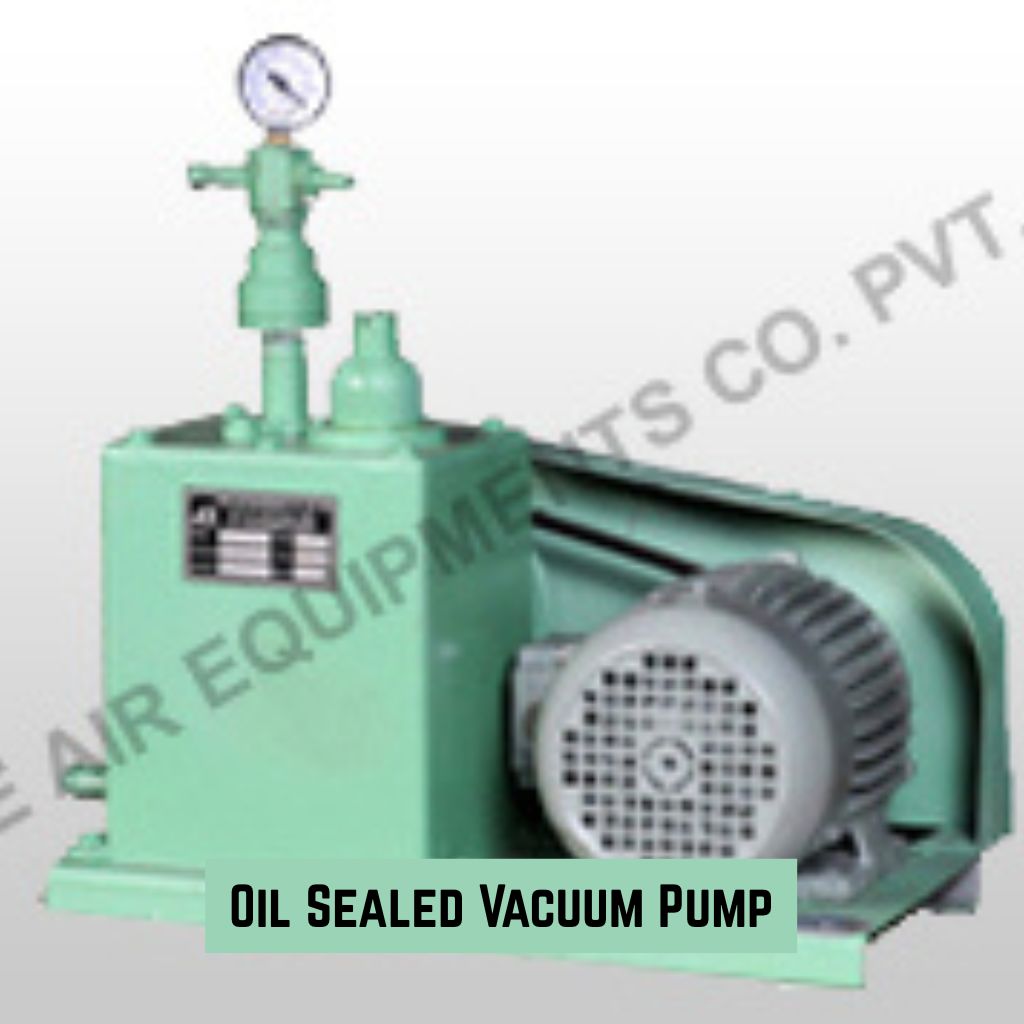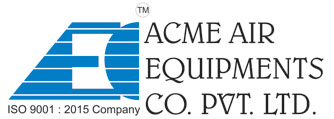Table of Contents
Oil-sealed vacuum pumps, including oil ring vacuum pumps and oil-sealed pumps, are widely recognized for their ability to generate high vacuum levels while ensuring reliability and performance. These pumps are essential in industries that require precise control over air and gas extraction processes, where even the smallest fluctuations in pressure or flow can have significant impacts on the quality of the end product.
The principle behind the operation of an oil-sealed vacuum pump is relatively simple. The pump uses oil as a sealing medium to create a vacuum by trapping air and gases, ensuring minimal leakage and enhanced sealing. This mechanism offers several benefits over dry vacuum pumps, including better performance at high vacuum levels, reduced energy consumption and longer service life.
This article explores the various industrial applications of oil-sealed vacuum pumps and how they contribute to operational excellence in different sectors.
How Are Oil-Sealed Vacuum Pumps Used in Chemical Processing?
In the chemical processing industry, maintaining a controlled vacuum environment is essential for several operations such as distillation, evaporation and solvent recovery. Oil sealed vacuum pumps play a critical role in ensuring that these processes run efficiently and safely.
Applications in Chemical Processing:
- Distillation and Evaporation: In chemical plants, oil-sealed vacuum pumps are used to create the necessary low-pressure environment for distillation and evaporation processes. This helps to lower the boiling points of liquids, facilitating separation without applying excessive heat, which can degrade sensitive chemicals.
- Solvent Recovery: Oil-sealed pumps are crucial in recovering solvents from chemical processes, ensuring that the solvents are efficiently captured for reuse, reducing waste and improving cost-efficiency.
- Vacuum Filtration: In chemical manufacturing, vacuum filtration is used to separate solids from liquids. Oil-sealed vacuum pumps ensure stable vacuum conditions, which are essential for effective filtration and preventing contamination.

By providing a reliable and efficient vacuum, oil-sealed vacuum pumps improve the consistency and effectiveness of chemical processing operations.
What Role Do Oil-Sealed Vacuum Pumps Play in the Pharmaceutical Industry?
The pharmaceutical industry is highly regulated, with strict requirements for product quality and safety. Oil-sealed vacuum pumps are indispensable in maintaining controlled conditions for critical processes such as lyophilization (freeze-drying), sterilization and solvent evaporation.
Pharmaceutical Applications:
- Lyophilization (Freeze-Drying): In the production of pharmaceutical products, oil-sealed vacuum pumps are used during lyophilization to remove moisture from sensitive drugs. The vacuum environment ensures that the product retains its potency and stability during the drying process.
- Sterile Filtration: Oil-sealed vacuum pumps support sterile filtration by providing the necessary vacuum to remove microorganisms from liquids and gases, ensuring the safety of pharmaceutical products.
- Solvent Removal: Many pharmaceutical processes involve the use of solvents. Oil seal vacuum pumps assist in evaporating solvents from pharmaceutical formulations under controlled vacuum conditions, enhancing the efficiency and safety of the manufacturing process.
The reliable performance of oil-sealed vacuum pumps ensures that pharmaceutical manufacturers can meet stringent quality standards while optimizing production efficiency.
How Are Oil-Sealed Vacuum Pumps Used in Food Packaging and Processing?
In the food industry, maintaining product quality and extending shelf life are paramount. Oil seal vacuum pumps are widely used in food packaging to create airtight seals and in food processing to maintain the required vacuum conditions for various applications.
Food Industry Applications:
- Vacuum Packaging: Oil-sealed vacuum pumps are widely used in vacuum packaging, which involves removing air from food packaging to extend shelf life. The pumps create a controlled vacuum environment that helps preserve the freshness of perishable products such as meat, dairy and fruits.
- Food Drying: In the food processing sector, oil-sealed vacuum pumps help remove moisture from food products through vacuum drying, preserving flavor, texture and nutritional content while preventing microbial growth.
- Evaporation and Concentration: Oil seal pumps are used in evaporators for concentrating liquids such as fruit juices, sauces and soups. By maintaining consistent vacuum conditions, these pumps help reduce processing times and energy consumption.
By providing consistent vacuum conditions, oil-sealed vacuum pumps enhance the efficiency of food packaging and processing, ensuring high-quality products while reducing operational costs.
How Do Oil-Sealed Vacuum Pumps Support the Electronics Industry?
The electronics industry, known for its precision and high standards, requires stable vacuum environments for several manufacturing processes, including vacuum coating, semiconductor fabrication and circuit board production. Oil seal vacuum system is essential in achieving the precise vacuum conditions required for these applications.
Electronics Industry Applications:
- Vacuum Coating: In electronics manufacturing, oil-sealed vacuum pumps are used in vacuum coating processes to deposit thin films of material onto substrates. These coatings are critical for applications such as OLED displays, photovoltaic cells and semiconductors.
- Semiconductor Fabrication: Oil sealed pumps are used in semiconductor fabrication processes, where precise vacuum conditions are necessary for etching and deposition. The high vacuum levels ensure that the microchips and integrated circuits meet the required specifications.
- Circuit Board Production: Oil-sealed vacuum pumps also assist in printed circuit board (PCB) manufacturing, where they help remove air and moisture during lamination and soldering processes.
By providing reliable vacuum conditions, oil-seal vacuum pumps ensure that manufacturing processes in the electronics industry are efficient, accurate and high-quality.
How Do Oil-Sealed Vacuum Pumps Contribute to Vacuum Metallurgy?
Vacuum metallurgy is a crucial process in industries that require high-purity metals, such as aerospace and automotive manufacturing. Oil-sealed vacuum pumps are essential in this field, as they help create the vacuum conditions necessary for melting, casting and refining metals.
Applications in Vacuum Metallurgy:
- Vacuum Arc Remelting (VAR): In vacuum arc remelting, oil-sealed vacuum pumps create the vacuum environment required to refine metals such as titanium, steel and superalloys, removing impurities and ensuring the material meets the necessary specifications.
- Vacuum Induction Melting (VIM): Oil-sealed vacuum pumps provide the high vacuum needed to melt metals in a vacuum induction furnace, allowing for the production of high-purity alloys used in advanced manufacturing applications.
Oil-sealed vacuum pumps play a vital role in ensuring the quality and consistency of metals produced in vacuum metallurgy processes.
Conclusion
Oil-sealed vacuum pumps are integral to the operation of various industrial processes that require stable and high vacuum conditions. From chemical processing and pharmaceuticals to food packaging and electronics, these pumps enhance the efficiency, performance and reliability of critical operations. Their ability to provide a consistent vacuum environment makes them essential in maintaining product quality, optimizing production processes and reducing operational costs.
In industries such as vacuum metallurgy and food processing, where precision and reliability are paramount, oil-sealed vacuum pumps continue to support operational excellence, ensuring that businesses can meet the increasing demands of both the market and regulatory standards. By understanding their diverse applications and benefits, businesses can leverage oil-sealed vacuum pumps to improve efficiency and achieve long-term operational success.
FAQs on Oil Sealed Vacuum Pumps
What is the working principle of an oil-sealed vacuum pump?
Oil-sealed vacuum pumps use oil as a sealing medium within the pump’s rotor. This oil creates a tight seal, which traps air and gases, thereby creating the vacuum environment required for various industrial processes.
What industries use oil seal vacuum pumps?
Oil-sealed vacuum pumps are used in numerous industries, including chemical processing, pharmaceuticals, food packaging, electronics and vacuum metallurgy, where high vacuum levels and reliable performance are critical.
How do oil-sealed pumps improve efficiency in industrial applications?
By providing consistent vacuum levels, oil-sealed vacuum pumps enhance process stability, reduce energy consumption and improve product quality, all of which contribute to increased operational efficiency.
How often should oil-seal vacuum pumps be maintained?
Routine maintenance should be carried out regularly, including checking the oil levels, changing the oil, inspecting components for wear and ensuring the pump is functioning properly to maintain optimal performance.
Can oil sealed vacuum pumps handle high vacuum levels?
Yes, oil-sealed vacuum pumps are designed to handle high vacuum levels, making them suitable for a variety of applications that require precise control over the vacuum environment, such as in chemical processing, pharmaceuticals and electronics manufacturing.
About Author

CEO
Mr. Vishwesh Pardeshi is the CEO of Acme Air Equipments Company Pvt. Ltd., an industrial and engineering goods manufacturing company based in Ahmedabad, Gujarat (India). He has taken over the responsibility from founding Partners and Directors of the Company, and is now leading a talented group of professionals since 2020 by bringing in vast industrial and management expertise. By qualification, he holds a Bachelor Degree in Mechanical Engineering and also holds a MBA degree from reputed institutes. Under his leadership, the Company has successfully executed prestigious projects by delivering high quality and world class products from a state of the art manufacturing facility which combines CNC-enabled precision manufacturing and strong after sales support. In line with the Vision, Mission and Core Values of the Organization, Mr. Vishwesh Pardeshi continues to drive Quality, Reliability and Global Expansion at Acme Air Equipments Co. Pvt. Ltd.









